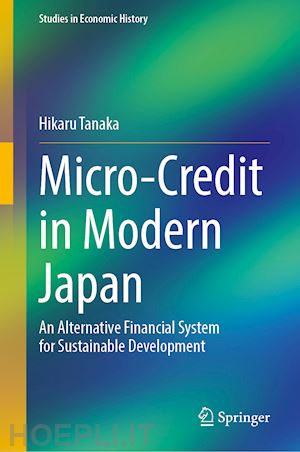

Questo prodotto usufruisce delle SPEDIZIONI GRATIS
selezionando l'opzione Corriere Veloce in fase di ordine.
Pagabile anche con Carta della cultura giovani e del merito, 18App Bonus Cultura e Carta del Docente
Japanese society believes they enjoy socio-economic equality. While industrialization tends to make gap between rich and poor, most of Japanese are proud of themselves as being middle class in the first Asian industrialized country. In fact, post WW2 Japanese economic miracle made Japan rich and equalized. High personal saving ratio supported the economic development in those days as if it’s a proof of Rostow’s take-off model. Japanese saving rate had jumped high level around the beginning of 20th century, which was the time of their industrialization taking place.
This book shows the savings was not only rich’s accumulation of wealth but ordinary citizen’s daily spares. The spare money helped whole nation’s economic development, especially supported relatively small farmers and self-employed workers. The personal small savings became huge funds for the basis of modern Japanese micro-credit and emergency bailout loan. Postal Savings Bank and nationwide cooperatives played the role in managing. This financial network was independent from ordinary financial system composed of private banks and securities market, and complement its function. The personal small savings funds in Japanese economy saved its society from various type of calamity and supported economic equalization as alternative financial system which acted as Not-for-Profit enterprises.
Introduction.- The Birth of Postal Savings.- Formation and Development of Industrial Cooperatives.- Return of Postal Saving to the Regions.
Dr. Hikaru Tanaka received her undergraduate, master and Ph.D. degrees in Economics from the University of Tokyo. The research focuses on Japanese socio-economic history, especially about the effect of economic system on ordinary life in industrialization process. Traveling various local areas supports the research to find what is universal or unique. Business History society of Japan awarded the author an encouragement award in 2018. After serving in Kobe University for several years, the author is now working in Chuo University as an assistant professor.











Il sito utilizza cookie ed altri strumenti di tracciamento che raccolgono informazioni dal dispositivo dell’utente. Oltre ai cookie tecnici ed analitici aggregati, strettamente necessari per il funzionamento di questo sito web, previo consenso dell’utente possono essere installati cookie di profilazione e marketing e cookie dei social media. Cliccando su “Accetto tutti i cookie” saranno attivate tutte le categorie di cookie. Per accettare solo deterninate categorie di cookie, cliccare invece su “Impostazioni cookie”. Chiudendo il banner o continuando a navigare saranno installati solo cookie tecnici. Per maggiori dettagli, consultare la Cookie Policy.